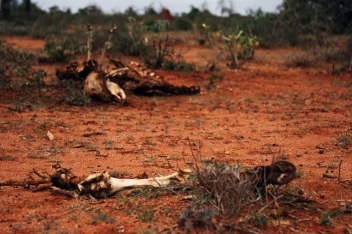 I travelled to Borana in Southern Ethiopia with my colleague Ahmed from our Ethiopia office.
I travelled to Borana in Southern Ethiopia with my colleague Ahmed from our Ethiopia office.
We were visiting to interview older people about the current situation in the area.
We spoke to the Borana Postoral Zone Leader, our partner there and also interviewed community members of two different kebeles or villages in Borana.
A single village can span up to 100 kilometres in diameter and be made up of around five clusters.
Lack of livestock is causing food crisis
According to the Pastoral Zone Leader, 250,000 livestock have died in the last 14 months in Borana alone due to the drought. This has had a huge impact on people’s livelihoods and has caused a major food crisis.
Driving out to the remote village clusters I could already see the devastating effects of the drought as we passed dead cattle along the way, lying on dry, red earth. In the Kobibebo cluster most households have recently lost between five and seven cattle each.
The most frustrating thing was that every morning I would wake up to a cover of thick black rainclouds but it just wouldn’t open up! Rain relief never came while I was there and still hasn’t.
Walking 26km for water
Speaking to community members in the villages it came to light that some people have to walk 26 kilometres to get to drinking water, which is inconceivable to me. Of course, this distance is absolutely impossible to manage for older people.
Whereas normally, people would eat two or three meals of maize and tea a day, that number has now dwindled to once per day or nothing at all. I was told that the cost of maize, which is the main diet in the area, has risen from 2 birr per kg (GBP 0.08) to 7-8 birr per kg (GBP 0.24) and is also often not available.
Older people suffer most as they prioritise feeding the younger generation before themselves. This lack of food leaves them weak and affects their immune system. There is generally an increase in diseases affecting the whole community because of the lack of food.
Drought is devastating a whole way of life
The drought has also affected older people’s roles in their communities and their shelter. Older people have an important role of problem solving and conflict management between families and clans. However, this has been hampered as they cannot get to meeting places as easily and have to cope with the drought first and foremost.
Their shelter has been affected because the long grass they use for the roofs of their huts is not available anymore. Now the huts only have branches as roofing instead of having the grass to complete it too. This means they do not have a fully secure home and they are not protected from the elements.
After my visit to the area it became clear to me that assistance is urgently needed to combat the many effects of this devastating drought.
HelpAge’s work is supported by our sister organisation Age UK. Please donate to Age UK’s East Africa appeal for vulnerable older people affected by the devastating drought in Ethiopia.
Age UK is raising money together with the Disasters Emergency Committee (DEC) for the East Africa Crisis Appeal. The DEC is a consortium of 14 aid agencies working together in times of disasters and emergencies.
Read more news on the east Africa crisis.
